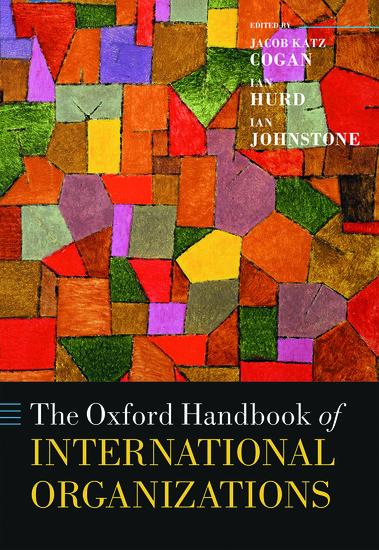
Zustellung: Di, 08.07. - Sa, 12.07.
Versand in 2 Wochen
VersandkostenfreiBestellen & in Filiale abholen:
The Oxford Handbook of International Organizations provides an authoritative account of the law and politics of international organizations. Looking at the role, function, and history of organizations, this Handbook offers a wide ranging and thorough analysis of the area.
The Oxford Handbook of International Organizations provides an authoritative account of the law and politics of international organizations. Looking at the role, function, and history of organizations, this Handbook offers a wide ranging and thorough analysis of the area.
Inhaltsverzeichnis
- I. Introduction
- 1.: Jon Pevehouse and Inken von Borzyskowski: International Organizations in World Politics
- 2.: Anne Peters: International Organizations and International Law
- 3.: Jeffrey Dunoff: The Law and Politics of International Organizations
- II. History
- 4.: Madeleine Herren: International Organizations, 1865-1945
- 5.: B.S. Chimni: International Organizations, 1945-Present
- III. Forms of Organization
- 6.: Jan Klabbers: Formal Inter-Governmental Organizations
- 7.: Peter Lindseth: Supranational Organizations
- 8.: Walter Mattli: Private Transnational Governance
- IV. Activities of Organizations
- 9.: Lise Morjé Howard and Anjali Dayal: Peace Operations
- 10.: James Cockayne: Counter-Terrorism and Transnational Crime
- 11.: Waheguru Pal Singh Sidhu: Non-Proliferation and Disarmament
- 12.: Dinah Shelton: Human Rights
- 13.: David J. Scheffer: Criminal Justice
- 14.: Thomas G. Weiss: Humanitarian Action
- 15.: Gil Loescher: Refugees and Internally Displaced Persons
- 16.: Joel Trachtman: Trade
- 17.: Manuela Moschella: International Finance
- 18.: Frank Schimmelfennig: Economic Relations and Integration
- 19.: David M. Malone and Rohinton P. Medhora: Development
- 20.: David A. Wirth: Environment
- 21.: Gian Luca Burci and Andrew Cassels: Health
- 22.: Brian Langille: Labour
- 23.: Helge Arsheim: Religion
- 24.: Ian Johnstone and Michael Snyder: Democracy Promotion
- 25.: Milton Mueller: Communications and the Internet
- V. The Functions of International Organizations
- 26.: Nigel D. White: Lawmaking
- 27.: Timm Betz and Barbara Koremenos: Monitoring Processes
- 28.: Jeremy Farrall: Sanctions
- 29.: Marc Weller: Use of Force
- 30.: John R. Crook: Dispute Settlement
- 31.: Jean-Marc Coicaud and David Le Blanc: Information Gathering, Analysis, and Dissemination
- VI. Relationships of International Organizations with Other Actors
- 32.: Laurence Boisson de Chazournes: Relationships of International Organizations with Other Actors
- 33.: Jan Aart Scholte: Relations with Civil Society
- 34.: George Kell: Relations with the Private Sector
- VII. Structure and Operations
- 35.: Margaret P. Karns: General Assemblies and Assemblies of States Parties
- 36.: Bjørn Høyland: Parliaments
- 37.: Ramses A. Wessel: Executive Boards and Councils
- 38.: Simon Chesterman: Executive Heads
- 39.: Touko Piiparinen: Secretariats
- 40.: Ramesh Thakur: High-Level Panels
- 41.: Chiara Giorgetti: International Adjudicative Bodies
- 42.: Jacob Katz Cogan: Financing and Budgets
- 43.: Stephen C. Nelson and Catherine Weaver: Organizational Culture
- VIII. International Institutional Law
- 44.: Niels Blokker: Constituent Instruments
- 45.: Stephen Mathias and Stadler Trengove: Membership and Representation
- 46.: Dan Sarooshi: Legal Capacity and Powers
- 47.: Jan Wouters and Jed Odermatt: Assessing the Legality of Decisions
- 48.: Pierre Klein: Responsibility
- 49.: August Reinisch: Privileges and Immunities
- 50.: Santiago Villalpando: The Law of the International Civil Service
- 51.: Santiago Villalpando: International Administrative Tribunals
- IX. Principles of Governance
- 52.: Dominik Zaum: Legitimacy
- 53.: Patrizia Nanz and Klaus Dingwerth: Participation
- 54.: Mathias Koenig-Archibugi: Accountability
- 55.: Jonas Tallberg: Transparency
Mehr aus dieser Reihe
Produktdetails
Erscheinungsdatum
17. Januar 2017
Sprache
englisch
Seitenanzahl
1344
Reihe
Oxford Handbooks
Herausgegeben von
Jacob Katz Cogan, Ian Hurd, Ian Johnstone
Verlag/Hersteller
Produktart
gebunden
Gewicht
1967 g
Größe (L/B/H)
254/180/63 mm
ISBN
9780199672202
Entdecken Sie mehr
Pressestimmen
Its biggest strength is, as with all handbooks, the variety of authors. ... one will find a broad range of different professional perspectives on International Organizations. Ralph Janik, Austrian Review of International and European Law
Bewertungen
0 Bewertungen
Es wurden noch keine Bewertungen abgegeben. Schreiben Sie die erste Bewertung zu "The Oxford Handbook of International Organizations" und helfen Sie damit anderen bei der Kaufentscheidung.

































